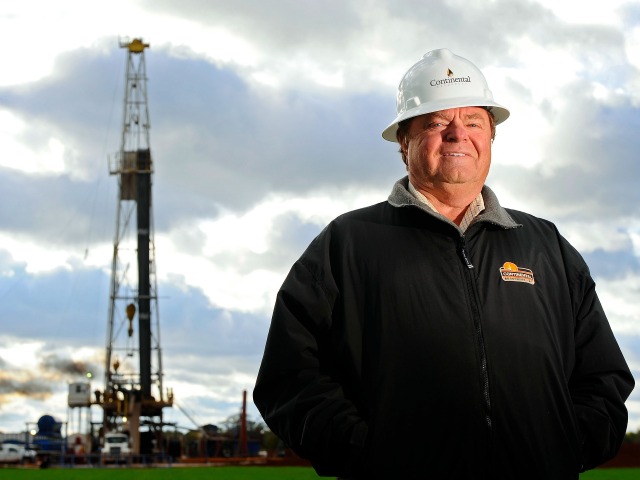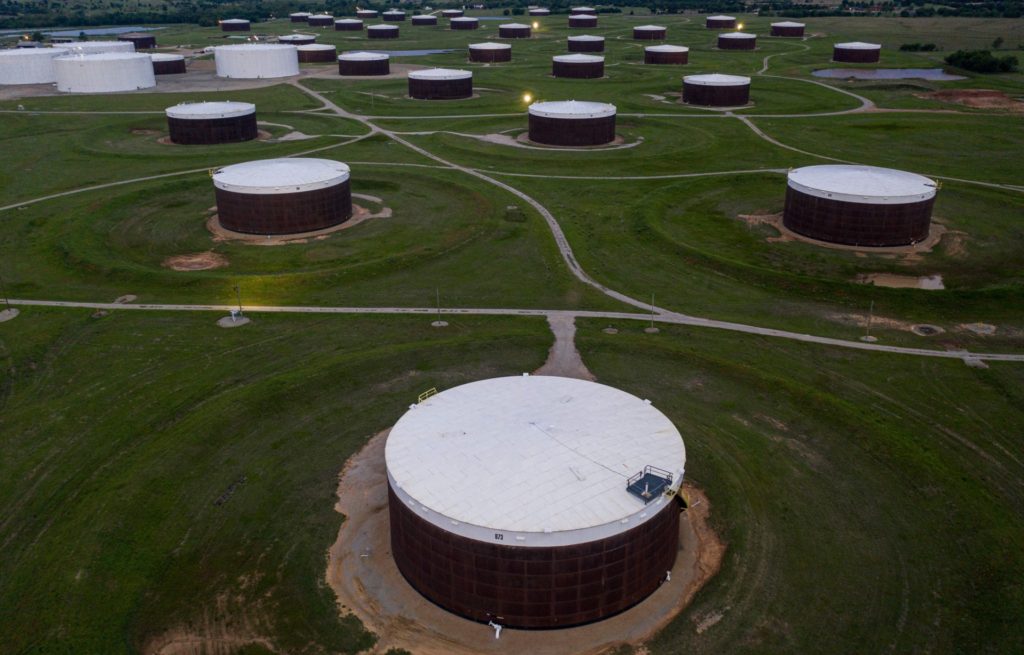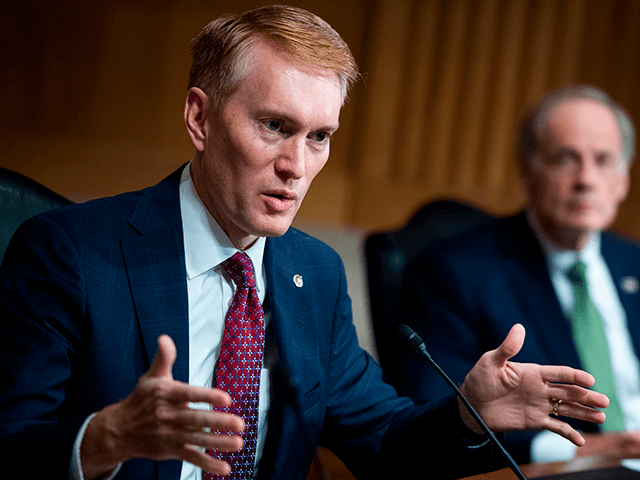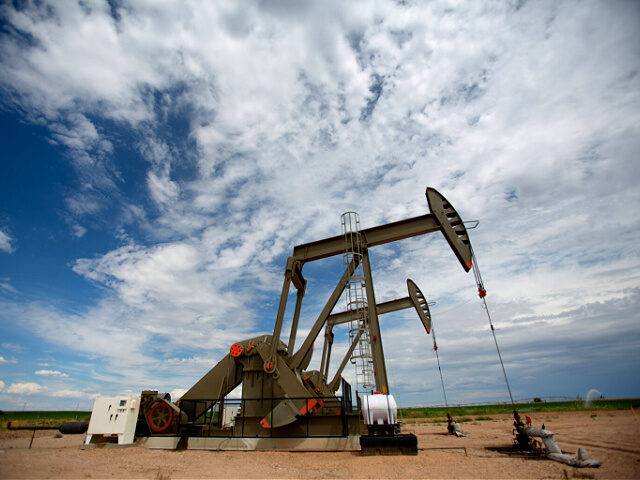OKLAHOMA CITY, Oklahoma — Political and energy industry leaders are convening for a two-day summit on energy security on Monday in what Sen. James Lankford (R-OK) told attendees is “the center of the energy universe.”
Lankford’s comments came at a welcome ceremony ahead of the American Energy Security Summit, a first-of-its-kind gathering of industry and political leaders hosted by the Hamm Institute for American Energy at Oklahoma State University (OSU).
“My main job is to say, ‘welcome to Oklahoma,’” Lankford said in remarks at a welcome gathering Sunday evening at the Omni Hotel in downtown Oklahoma City. “I have so many folks I have visited with just around this reception that have said to me, ‘this is my first time to be able to be in Oklahoma.’ Well, welcome. This is actually the center of the energy universe. We’re glad you actually got here today to see what’s going on in the center of the energy universe.”
Lankford spoke right after Dr. Kayse Shrum, the president of OSU, at a power-packed gathering at a restaurant inside the hotel. Shrum said this event will be a “gathering like no other.”

Harold Hamm, chairman of Continental Resources Inc., stands near an oil rig outside Watonga, Oklahoma, on Wednesday, Oct. 22, 2008. (Larry Smith/Bloomberg via Getty Images)
“In just a few hours, dignitaries from around the world and across the nation will converge on the Hamm Institute for American Energy,” Shrum said, opening the ceremony. “We have the most notable thought leaders, decision-makers, and influencers all in the same room to participate in a robust and critically important discussion about energy security and what it means for economic prosperity, national security, and world peace.”
The highlight of Sunday evening’s welcome ceremony was a panel discussion moderated by CNBC’s Brian Sullivan with Harold Hamm — the multibillionaire founder and executive chairman of Continental Resources — and former Secretary of State Mike Pompeo. Gathered in the standing-room-only audience in Bob’s Steak and Chop House at the Omni Hotel downtown Oklahoma City was a powerful bunch of leaders, including several cabinet secretaries from former President Donald Trump’s administration in addition to Pompeo, such as former Attorney General Bill Barr and former Secretary of Transportation Elaine Chao, as well as lawmakers like Rep. Stephanie Bice (R-OK), Lankford, and 2024 GOP presidential candidate North Dakota Gov. Doug Burgum. At Monday’s event, fellow 2024 candidate and former U.S. ambassador to the United Nations Nikki Haley will speak, as will former U.S. Energy Secretary Dan Brouillette and many others.
“We all know that energy runs our world,” Hamm said when CNBC’s Sullivan asked him to sum up the purpose of this conference.
Hamm later hammered the point that he frequently makes about emotion, rather than intelligence, too often driving energy policy. “It’s about being smart. It’s about IQ instead of EQ, as I call it — the intelligence quotient instead of the emotional quotient,” Hamm said. “We’ve got to be smart about energy. If we can get our act together here, the better off the whole world will be.”
Pompeo joked that when Hamm called him to invite him to this event, he was “at home counting the gold bars in my safe” — a jab at Sen. Bob Menendez (D-NJ), who was just indicted for allegedly taking gold bars and significant sums of cash as bribes — prompting laughter and some jeers from the audience and leading Pompeo to wonder aloud if the joke was “too soon.”
“The reality is there were very few meetings I had either as CIA director or as secretary of state where energy wasn’t at or near the top of the list,” Pompeo said on a more serious note.
Lankford, in his remarks, said that Democrats will often predict to him that America will ditch oil and gas by 2035.
“We talk a lot in the United States Senate about how we are going to be able to move our country forward and the incredible block that is currently happening on the simple issue of permitting and where we’re going to go in the future,” Lankford said. “It’s fascinating to me and I have this wonderful conversation so often with my Democratic friends and colleagues — not to be a partisan obviously — who say, ‘this is where we’re going to be in 2035.’”
Lankford noted that he will smile back at them and then start reciting data to the Democrats, including top members of President Joe Biden’s administration. “You’ve got the political world and you’ve got the data world, and they definitely don’t agree. We’re a part of the data world,” Lankford said.
On that note, right after Lankford, the next speaker was Dr. Amrita Sen — the founder and director of research for Energy Aspects — a global research house that advises hundreds of companies on energy matters.
Sen noted that the percentage of fossil fuel usage as an energy source is the same now — 82 percent — as it was in the 1980s.

An aerial view of a crude oil storage facility is seen on May 5, 2020, in Cushing, Oklahoma. (JOHANNES EISELE/AFP via Getty Images)
Hamm predicted during the panel that it will not change in the coming decades, even with the push towards electric vehicles and other changes in the energy industry. Asked by Sullivan where the demand for oil and gas will be in 25 years, Hamm predicted it will be “about the same.”
“All the studies that have been done shows that we’re going to be on oil and gas for the next hundred years,” Hamm said.
Pompeo lambasted the Biden administration’s electric vehicle policies, too, arguing they are the driving force behind the United Auto Workers’ (UAW) current strikes.
“You can see thousands of UAW workers on strike as we’re going to move to EVs over several hours or whatever the Biden administration is hoping for,” Pompeo said. “That’s not political. That’s just bad math.”
Sen, during her remarks, also pointed to developing nations as a driver of energy demand.
“Fifteen percent of the world’s population consumes 40 percent of the world’s energy,” Sen said. “It’s very easy for us to say, ‘you developing countries shouldn’t be burning electricity of any kind.’ We don’t have the right to say that. I grew up in India. When I grew up, electricity wasn’t guaranteed. That is true today of pretty much all of Africa and a significant part of Latin America and Southeast Asia. I think we have to get out, particularly for the U.S. which is such a huge producer and potential producer of oil and gas, it doesn’t make sense to not serve those energy needs.”
Sen predicted that the demand for oil and gas will “continue to rise” worldwide, particularly in “emerging market countries.”
“Energy consumption and economic growth go hand-in hand,” Sen said, noting that the world, and particularly the United States, is “sleep walking into” a “crisis” of a lack of enough energy being produced to meet growing demand worldwide.
“Somehow, with the issues we have on the political front and not being able to communicate between industry and politics of political scenarios, I fear this crisis is only going to get worse and worse,” Sen said. High oil and gas prices — or at least oil prices — are here to stay simply because of some of these issues with the mismanagement of our supply. Gas is slightly different but again — longer term — very, very similar.”
There needs to be, Sen said, “collaboration” between industry and government, and “governments have to understand the need to have security of demand if they are going to have security of supply.”
Pompeo said he hopes the United States will recognize its potential in energy production.
“The United States has got to do its part to deliver this highly affordable product that will serve the entire world,” Pompeo said.

Sen. James Lankford (R-OK) during the Senate Homeland Security and Governmental Affairs hearing. (TOM WILLIAMS/POOL/AFP via Getty Images)
But perhaps Lankford put it best when he predicted that the most important part of this novel gathering will be the fact that it is forcing a conversation about energy between those who make it and those who make policy about it.
“When I say welcome, I’m fully aware that the power of the conversation will be some of the things that happen in the session but quite frankly it will be many of the conversations you have over dinner and breakfast and in side conversations in the hallways and inside meetings,” Lankford said. “I encourage you to pull people aside and start talking.”
“For all of you that make it possible for me to drive my truck, fly on an airplane back and forth to Washington, DC, and flick a light switch on in my house, thank you for what you do,” the senator added.

COMMENTS
Please let us know if you're having issues with commenting.